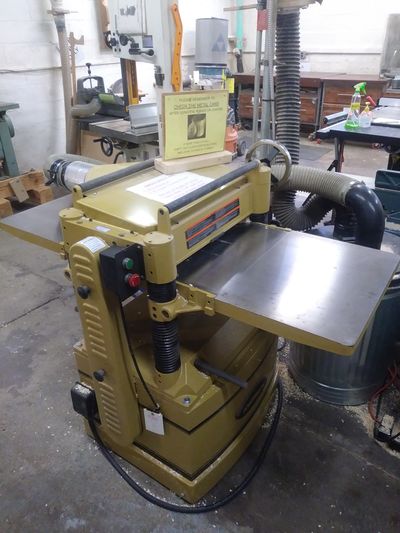20 Inch Planer
About our machine
- Model: Powermatic 209HH
- A safety checkout is required to use this tool
- Acquired through fundraising and a matching grant from the Guild of NH Woodworkers!
Rules
- NO RECLAIMED OR QUESTIONABLE LUMBER. If it used to have nails/staples in it, or if it was treated with chemicals, do not run it through this planer. Talk to the General Manager or Wood Shop Manager about using the smaller planer for this.
- NO METAL. DO NOT RUN NAILS, STAPLES, OR ANY NON-WOOD OBJECTS THROUGH THIS PLANER
- CLEAN UP EPOXY. Be absolutely sure it is cured. Empty dust collector before and after to avoid contaminating the contents. Check for residue and clean with isopropyl afterwards.
- EMPTY DUST COLLECTOR WHEN 1/2 FULL. Full bags go outside by trash.
- If you put excessive wear on the blades you will be expected to pay for sharpening or new blades.
- Take light passes on harder woods (1/4 turn)
Guides and Manuals
How to operate
- Connect the dust collection hose
- Set the height of the table. Your board should pass just underneath the metal plate in the middle
- If your board is particularly long, set up support rollers on the infeed and outfeed sides to match the current height
- Turn the dust collector on
- Turn the planer on
- Feed your board in straight until the rollers grab it and start to pull it
- Move towards the outfeed side to support the end of it as it comes out
- Once the board has exited the planer, carry it back to the in feed, adjust the height either an eight of a turn or a quarter of a turn
- Make another pass, and repeat steps 6 through 8 until the board is the desired thickness
- Turn off the planer and dust collector. Sweep up any chips around the planer. You can leave the dust collection hose connected
General Tips and Safety
- Inspect your board for knots or loose pieces that could come flying out. Remove them before sending through the planer.
- If a workpiece is jammed, it may be because your board is not perfectly flat. Try taking a lighter pass. For more severely distorted boards flatten the board out on one side first.
Helpful Videos
- How to Use a Surface Planer | Woodworking - Howcast on Youtube
Maintenance
Parts:
Main Menu
| General | Spaces | Tools | Volunteer | Instructors | Community | Communication |
|
- - - - - - |
Reimbursement Form - paper Reimbursement Form - digital
|
Slack - member chat |
- - - - - - |
